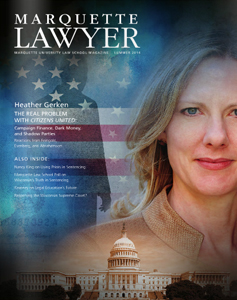So What Do You Think of Mary Burke?
On one level, the results released Wednesday of a fresh round of the Marquette Law School Poll did not contain much new. As Charles Franklin, professor of law and public and policy and director of the poll, said frequently during the “On the Issues with Mike Gousha” event at which results were presented, there was not much that was statistically different from the poll two months ago. The big headline – and it did, indeed, make big headlines – was that Republican Gov. Scott Walker and Democratic challenger Mary Burke are essentially tied. That was the central result of the May poll as well.
I would suggest two important points that the little-changed results suggest:
One: The May results caught many people by surprise. There seemed to be a perception that, while the race was close, Walker was leading. The Law School Poll is the most closely watched and respected measure of public opinion in Wisconsin, and for the results to show a tie changed the perception of the race. But, as Franklin said on Wednesday, there were suggestions that the results might be a one-time matter, an “outlier.” To have almost identical results two months later should put to rest that notion. The only reasonable conclusion is that this really is a race that is tied at this point. The intense level of campaigning, more than three months before the November election, shows that the candidates themselves are operating on the understanding that this is an intense, highly competitive election that either could win.

 Past, present, future—the Summer 2014 Marquette Lawyer focuses its attention on important and interesting facets of all three. But let us draw your attention to it foremost for its thoughts on the future, including:
Past, present, future—the Summer 2014 Marquette Lawyer focuses its attention on important and interesting facets of all three. But let us draw your attention to it foremost for its thoughts on the future, including: